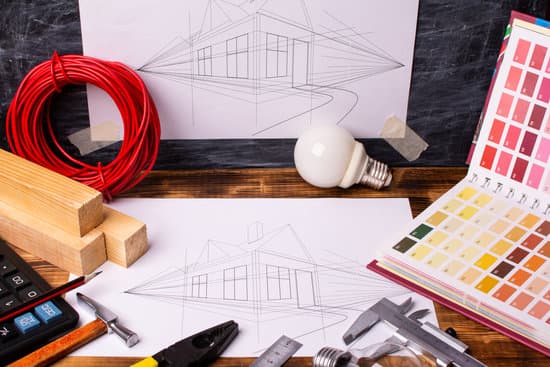Are you wondering, “Can I deduct home improvement expenses?” Home improvement projects can be a significant financial investment for homeowners. Understanding the tax implications and potential deductions related to these expenses is crucial. This article will provide insight into the concept of home improvement expenses and the importance of knowing how they can impact your tax liability.
When it comes to home improvement expenses, there are various types that may be eligible for tax deductions. From energy-efficient upgrades to medical necessities and home office renovations, homeowners may be able to offset some of the costs through potential tax benefits. It’s essential to understand which expenses qualify for deductions and how they can affect your overall tax situation.
The Internal Revenue Service (IRS) has specific guidelines and criteria for determining which home improvement expenses can be deducted. By familiarizing yourself with these regulations, you can ensure that you are maximizing your potential deductions within the boundaries of the law. In the following sections, we will delve into the IRS guidelines, eligibility requirements, documentation practices, and the process of claiming these expenses as tax deductions.
Types of Home Improvement Expenses
Home improvement expenses cover a wide range of upgrades and renovations that homeowners make to their properties. There are several types of home improvement expenses that may be eligible for tax deductions, provided they meet certain criteria set by the IRS. One type of home improvement expense that can potentially be deducted is energy-efficient upgrades.
This includes the installation of solar panels, energy-efficient windows, insulation, and other eco-friendly enhancements. Homeowners who make these improvements to reduce their energy consumption and environmental impact may be able to claim a tax credit or deduction for these expenses.
Additionally, medical necessities such as wheelchair ramps, handrails, and other accessibility modifications may also qualify as deductible home improvement expenses. These adjustments are often made to accommodate individuals with disabilities or medical conditions, and they can be considered eligible for tax deductions if they meet the IRS guidelines.
Furthermore, home office renovations can also potentially qualify as deductible home improvement expenses under certain circumstances. For example, if a homeowner converts a portion of their property into a dedicated home office space used exclusively for business purposes, the costs associated with this renovation may be eligible for tax deductions.
Understanding Energy-Efficient Upgrades
When considering energy-efficient upgrades as potential deductible home improvement expenses, it’s important to understand which specific improvements qualify for tax credits or deductions. For instance, certain solar energy installations may qualify for the Residential Renewable Energy Tax Credit, while other energy-efficient upgrades may fall under the Nonbusiness Energy Property Credit.
Medical Necessities and Accessibility Modifications
For homeowners making medical necessity-related improvements or accessibility modifications to their properties, it’s crucial to ensure that these changes are directly related to accommodating disabilities or medical conditions. Keeping detailed documentation and receipts for these expenditures is essential in order to support any claims made for tax deductions on these home improvement expenses.
Home Office Renovations
When it comes to home office renovations as potential deductible expenses, homeowners should be aware that the IRS has specific rules regarding what qualifies as a legitimate home office space. Understanding these guidelines can help prevent any potential issues with claiming deductions related to home office renovations.
IRS Guidelines
When it comes to deducting home improvement expenses, it is crucial to understand the specific guidelines and criteria set by the IRS. Not all home improvements are eligible for tax deductions, so homeowners must familiarize themselves with the rules to ensure compliance and maximize their potential deductions. The IRS provides clear guidance on which home improvement expenses can be deducted and which cannot, helping taxpayers navigate the complexities of tax laws.
According to IRS guidelines, eligible home improvement expenses must meet certain criteria to qualify for tax deductions. One key requirement is that the improvements must be considered a “capital improvement” rather than a regular repair or maintenance. This distinction is important because capital improvements can typically be depreciated over time, allowing homeowners to claim deductions for the depreciation expense. Examples of capital improvements include adding a new room, replacing the roof, or installing energy-efficient upgrades.
Another important consideration is whether the home improvement expenses directly contribute to the value of the property. According to IRS guidelines, any expenses that increase the value of the property or extend its useful life may be eligible for tax deductions. This includes renovations or additions that enhance the overall functionality or aesthetics of the home. However, it’s essential to keep in mind that certain luxury items or enhancements purely for personal enjoyment may not qualify for deductions.
In addition to meeting these criteria, homeowners must also ensure that they have documentation and receipts to support their claims for home improvement tax deductions. Detailed records of all expenses related to qualifying improvements should be retained and organized in case of an IRS audit. By following these guidelines and maintaining thorough documentation, homeowners can confidently navigate the process of claiming home improvement expenses as tax deductions while staying in compliance with IRS regulations.
| Criteria | Description |
|---|---|
| Capital Improvement | Expenses must be considered a “capital improvement” rather than regular repair or maintenance. |
| Contribution to Property Value | The expenses must directly contribute to increasing the value of the property or extending its useful life. |
| Documentation | Detailed records and receipts are required to support claims for home improvement tax deductions. |
Eligibility Requirements
When it comes to deducting home improvement expenses on your taxes, it is important to understand the specific eligibility requirements set forth by the IRS. Meeting these requirements is crucial in order to qualify for tax deductions related to home renovations and improvements. Here are some key eligibility criteria that homeowners must meet in order to claim these expenses on their tax return:
- Ownership of the Property: In order to deduct home improvement expenses, you must be the owner of the property on which the improvements were made. If you are renting a property and make improvements, you typically cannot deduct those expenses.
- Use of the Property: The IRS requires that the improvements made to your home must be used for personal purposes. This means that any renovations or upgrades made for business or income-generating activities may not be eligible for tax deductions.
- Capitalization vs. Expense: The IRS distinguishes between repairs or maintenance expenses and capital improvements. While repairs are not usually deductible, certain capital improvements can be depreciated over time, providing a different tax benefit.
Meeting these eligibility requirements is essential for homeowners who want to take advantage of potential tax benefits associated with home improvement expenses. It is important to ensure that you meet all necessary criteria before attempting to claim these deductions on your tax return.
It’s also worth noting that there may be additional considerations based on individual circumstances. Consulting with a tax professional or accountant can provide personalized guidance regarding your specific situation and help ensure that you are maximizing your potential deductions for home improvement expenses.
Documentation and Receipts
Keeping thorough documentation and receipts for all home improvement expenses is crucial in order to successfully claim deductions on your taxes. The IRS requires detailed records to support any deductions you claim, so it’s essential to maintain organized and accurate documentation of your expenses. This includes invoices, receipts, contracts, and any other relevant paperwork related to the home improvement projects.
When it comes to claiming home improvement expenses as tax deductions, proper documentation serves as evidence that the expenses were necessary and directly related to maintaining or improving your home. Without these records, you may not be able to substantiate your claims if the IRS were to audit your tax return. Therefore, it’s in your best interest to keep thorough and well-organized documentation throughout the entire process of a home improvement project.
In addition to keeping physical copies of receipts and documents, it’s also beneficial to create digital backups or scans of all relevant paperwork. This extra layer of protection can serve as a backup in case any physical documents get lost or damaged. By being diligent about documenting and retaining records of your home improvement expenses, you can ensure that you are prepared to claim any eligible deductions without encountering unnecessary challenges from the IRS.
Tax Deduction Process
When it comes to claiming home improvement expenses as tax deductions, it’s important for homeowners to understand the process and know where and how to report these expenses on their tax return. This section will provide a step-by-step guide to help readers navigate through the tax deduction process.
Determine Eligibility
Before claiming any home improvement expenses as deductions, homeowners must ensure that they meet the eligibility requirements set by the IRS. This includes factors such as ownership and use of the property. Understanding these criteria is crucial in determining which expenses can be deducted.
Keep Thorough Documentation
In order to successfully claim home improvement expenses as tax deductions, homeowners should keep thorough documentation and receipts for all expenditures related to the improvements. This includes invoices from contractors, receipts for materials purchased, and any other relevant documents that demonstrate the costs incurred for the improvements.
Report Expenses on Tax Return
When filing their tax return, homeowners can typically report home improvement expenses under Schedule A (Form 1040) if they itemize their deductions. They will need to complete Form 5695, Residential Energy Credits if they made any energy-efficient upgrades, and Form 4684, Casualties and Thefts if the improvements were due to a casualty or theft.
By following this process and consulting with a tax professional or accountant if needed, homeowners can confidently navigate through the tax deduction process for home improvement expenses and maximize their potential deductions.
Common Mistakes to Avoid
When it comes to deducting home improvement expenses, there are several common mistakes that homeowners should be aware of in order to ensure that they are maximizing their potential tax benefits. By avoiding these errors and misconceptions, homeowners can navigate the process of claiming deductions more effectively.
Here are some common mistakes to avoid when trying to deduct home improvement expenses:
- Not Differentiating Between Repairs and Improvements: One common mistake that homeowners make is failing to distinguish between repairs and improvements. While repairs are typically not deductible, certain home improvements, such as those that improve energy efficiency or accommodate medical needs, can qualify for tax deductions.
- Overestimating Eligible Expenses: Another error that homeowners often make is overestimating the amount of their home improvement expenses that are eligible for deductions. It’s important to review the IRS guidelines carefully and consult with a tax professional to accurately determine which expenses qualify for deductions.
- Failure to Keep Detailed Documentation: Keeping thorough documentation and receipts for all home improvement expenses is crucial when claiming deductions. Many homeowners make the mistake of not keeping detailed records, which can lead to complications during the tax filing process.
To avoid these mistakes and ensure that you are maximizing your potential tax benefits from home improvement expenses, consider the following tips:
- Educate Yourself on IRS Guidelines: Familiarize yourself with the specific guidelines set by the IRS for deducting home improvement expenses. Understanding what qualifies as a deductible expense can help you avoid unnecessary errors.
- Consult with a Tax Professional: Seeking advice from a tax professional or accountant can provide valuable insight into which home improvement expenses can be deducted and how to accurately report them on your tax return.
- Keep Detailed Records: Maintain organized documentation and receipts for all home improvement expenses in order to substantiate your deduction claims in case of an audit.
By being mindful of these common mistakes and taking proactive steps to avoid them, homeowners can better position themselves to take advantage of potential tax benefits related to their home improvement expenses.
Consultation With Tax Professionals
When it comes to claiming tax deductions for home improvement expenses, seeking advice from tax professionals or accountants is crucial in order to ensure that homeowners are maximizing their potential deductions. Tax laws and regulations can be complex and often subject to change, so having a knowledgeable professional on your side can help you navigate the process more effectively.
One of the key reasons why consultation with tax professionals is important is because they can provide personalized guidance based on your specific financial situation. They can help you determine which home improvement expenses are eligible for deductions according to the IRS guidelines, as well as advise you on any eligibility requirements that you need to meet in order to qualify for these deductions.
Furthermore, tax professionals can assist homeowners in avoiding common mistakes when trying to deduct home improvement expenses. This includes providing accurate documentation and receipts, reporting the expenses correctly on their tax return, and steering clear of misconceptions that may lead to errors in claiming deductions. By working with a professional, homeowners can mitigate the risk of making costly mistakes that could potentially get them into trouble with the IRS.
Conclusion
In conclusion, it is crucial for homeowners to understand the potential tax benefits of home improvement expenses. By familiarizing themselves with the IRS guidelines and eligibility requirements, homeowners can determine which types of home improvement expenses may be eligible for tax deductions. It is essential to keep thorough documentation and receipts for all home improvement expenses in order to successfully claim these deductions on their tax return.
Furthermore, seeking advice from tax professionals or accountants can help homeowners maximize their potential deductions for home improvement expenses. These professionals can provide valuable insight into the deduction process and ensure that homeowners are not making common mistakes that could jeopardize their ability to claim these expenses.
Overall, educating oneself on the potential tax benefits of home improvement expenses can ultimately result in significant savings for homeowners. By taking advantage of available deductions, homeowners may be able to offset some of the costs associated with improving their property while also enjoying the long-term benefits of a more energy-efficient, medically necessary, or functional living space.
Can i deduct home improvement expenses? The answer lies in understanding the guidelines and requirements set by the IRS, as well as seeking professional guidance when necessary.
Frequently Asked Questions
Can You Use Home Improvements as a Tax Write Off?
Yes, in some cases, home improvements can be used as a tax write off. These deductions may include energy-efficient home improvements or modifications for medical purposes. It’s important to keep detailed records and consult a tax professional.
Are Renovation Costs Tax Deductible?
Renovation costs are not typically tax deductible for personal properties, as they are considered personal expenses. However, if the renovations are made for business purposes or rental properties, they may be eligible for tax deductions.
How Do I Prove Home Improvements Without Receipts?
Proving home improvements without receipts can be challenging when it comes to tax deductions. Other forms of evidence that can help support your claim include bank or credit card statements, contractor invoices, before and after photos, and written agreements with contractors or suppliers. Keeping thorough records is key to proving your home improvements without receipts.

I’m thrilled to have you here as a part of the Remodeling Top community. This is where my journey as an architect and remodeling enthusiast intersects with your passion for transforming houses into dream homes.





